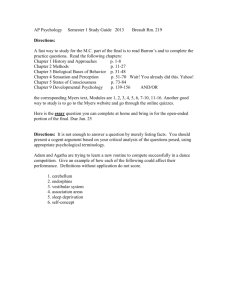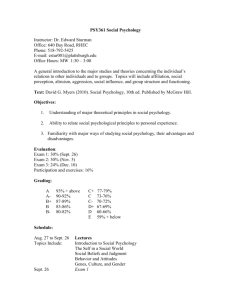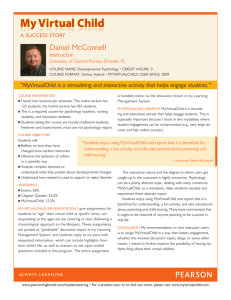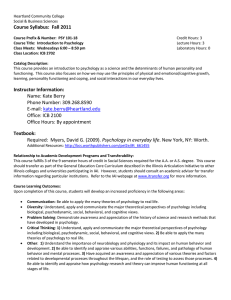psychology 101 (iai: s6 900, spe 912)
advertisement
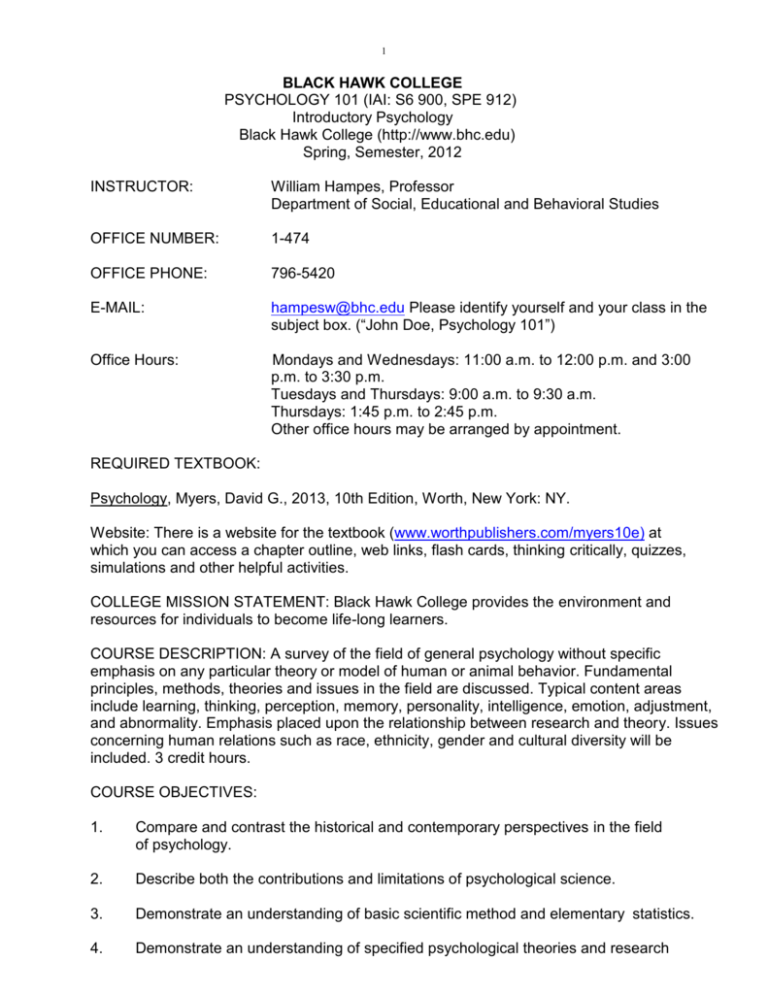
1 BLACK HAWK COLLEGE PSYCHOLOGY 101 (IAI: S6 900, SPE 912) Introductory Psychology Black Hawk College (http://www.bhc.edu) Spring, Semester, 2012 INSTRUCTOR: William Hampes, Professor Department of Social, Educational and Behavioral Studies OFFICE NUMBER: 1-474 OFFICE PHONE: 796-5420 E-MAIL: hampesw@bhc.edu Please identify yourself and your class in the subject box. (“John Doe, Psychology 101”) Office Hours: Mondays and Wednesdays: 11:00 a.m. to 12:00 p.m. and 3:00 p.m. to 3:30 p.m. Tuesdays and Thursdays: 9:00 a.m. to 9:30 a.m. Thursdays: 1:45 p.m. to 2:45 p.m. Other office hours may be arranged by appointment. REQUIRED TEXTBOOK: Psychology, Myers, David G., 2013, 10th Edition, Worth, New York: NY. Website: There is a website for the textbook (www.worthpublishers.com/myers10e) at which you can access a chapter outline, web links, flash cards, thinking critically, quizzes, simulations and other helpful activities. COLLEGE MISSION STATEMENT: Black Hawk College provides the environment and resources for individuals to become life-long learners. COURSE DESCRIPTION: A survey of the field of general psychology without specific emphasis on any particular theory or model of human or animal behavior. Fundamental principles, methods, theories and issues in the field are discussed. Typical content areas include learning, thinking, perception, memory, personality, intelligence, emotion, adjustment, and abnormality. Emphasis placed upon the relationship between research and theory. Issues concerning human relations such as race, ethnicity, gender and cultural diversity will be included. 3 credit hours. COURSE OBJECTIVES: 1. Compare and contrast the historical and contemporary perspectives in the field of psychology. 2. Describe both the contributions and limitations of psychological science. 3. Demonstrate an understanding of basic scientific method and elementary statistics. 4. Demonstrate an understanding of specified psychological theories and research 2 5. Articulate research-based knowledge concerning the application of psychological principles to everyday life, including individual differences, class differences, and cultural diversity. 6. Identify principles that contribute to interactions that promote an understanding of racism, sexism, homophobia, and sexual harassment. 7. Be able to discuss the APA code of ethics. ATTENDANCE: Attendance will be taken and is crucial for success in the course. If a student comes in after the roll is called, it is his or her responsibility to see the instructor after class to correct the roll. Anyone who misses over half the class will be marked absent. TESTS: There will be five examinations, four hourly examinations and the final. Each examination, including the final, will be worth 60 points. SUMMARY OF ARTICLE: As part of each of the examinations students are required to write a one or two page, typed, double spaced summary, size12 font , at least 25 lines long, and in his or her own words, of an article from the “Monitor on Psychology Articles” section of the http://:www.apa.org website about a topic in the unit. To get to the articles you need to log in at http://www.apa.org, then click on a topic (Addictions, ADHD, etc.), and then choose an article from “Monitor on Psychology Articles”. In the paper you also need to discuss how the ideas in the article are related to the Myers textbook. When referring to concepts or research in the Myers textbook, you need to cite the page in Myers in which that concept or research is found (e.g. Myers, page 450). To receive the maximum number of points you need to refer to concepts and/or research on two separate pages (e.g. Myers, page 315 and Myers, page 321). Each paper is due a week before the test date for that unit and is worth 10 points. The student needs to hand in the article itself along with the summary. One point will be taken off the paper for every BHC school day it is overdue. (A school day is any day BHC is open.) EXTRA CREDIT: For ten extra credit points, students may do a summary of a scholarly article about a topic in the textbook. The summary should be typed with double spacing, size 12 font and be at least 25 lines long. The student should also hand in the article when handing in the summary. The article and summary are due by Wednesday, May 2. One point will be taken off the paper for every BHC school day it is overdue. (A BHC school day is any day BHC is open.) Key Points to Keep in Mind for Written Projects and Essays: 1. When you write sentences that can be interpreted in many different ways (and you do not make clear which meaning you intend), you demonstrate that you are writing, and presumably, thinking in a vague way. You should therefore strive to write so that you make clear precisely what you mean. 2. When you do not give concrete examples and illustrations to make your point clear, you demonstrate that you do not know how to clarify your thought (or for some reason have chosen not to do so). You should therefore give examples and illustrations wherever clarification of your meaning is needed. 3 3. When you do not make clear-with appropriate transitional words and critical vocabulary-the logical relations between the sentences you write, you make it evident that you are not thinking in terms of the logic of your thought, that you do not fully understand the structure of your own reasoning. You should therefore make clear the logical relations between the sentences and paragraphs that you write. Cheating and Plagiarism Policy: At the beginning of the semester, each instructor informs students about the College policy on cheating and plagiarism. Each student bears the ultimate responsibility for being aware of College policy, regardless of whether or not the faculty member has provided this information. The College Policy is found in the Student Handbook. Since it is the faculty member’s responsibility to assign grades, it is also his/her prerogative to determine what constitutes cheating or plagiarism in his/her classes. The faculty member determines the consequences for cheating or plagiarism. Unless that judgment can be shown to be either capricious, arbitrary or in bad faith, the faculty member’s judgment will stand. For example, if a student cheats or plagiarizes on a “minor” assignment or test, a faculty member could assign a grade of “F” for that paper or test. If the student cheats again, he/she could receive an “F” or “X” for the course. If a student cheats or plagiarizes on a “major” assignment or test, a faculty member will often assign an “F” or X” for the course and the case may be reported to the Student Disciplinary Committee. Definition of Plagiarism: Plagiarism may take any one of three forms: 1. Passing off words and/or images of another as one’s own. 2. Passing off the ideas of another as one’s own. 3. Using the original organizational scheme or plot of another as one’s own. SCORING STANDARDS: With a maximum of 300 points the scoring standards for the final grade are the following: A = 270-300 B = 240-269 C = 210-239 D = 180-209 F = 179 and below MAKEUP EXAMINATIONS: No students will receive make-ups for tests they have taken. Attendance will be taken into consideration in granting make-ups. Makeups will be given in the Testing Room of the Independent Learning Center in Building 1. Students who want to take makeups need to check the times the Testing Room is open. CELL PHONES: The use of cell phones and texting in class are not allowed. STUDENT HANDBOOK: Check your current BHC Student Handbook for important information about college processes, policies, and procedures. 4 ADA ACCOMODATION: If you have a disability for which you are or may be requesting an accommodation, please contact your instructor and the Office of Student Accommodations, at 796-5900. WITHDRAWING FROM THE CLASS: After the twelfth week of class students who wish to withdraw from the course must get the written approval of the instructor. Also, after the twelfth week of class, the instructor by himself cannot drop a student from the class. COURSE SCHEDULE The Story of Psychology ..............................................................Prologue Thinking Critically with Psychological Science ..............................Chapter 1 The Biology of Mind ........................................................ Chapter 2 First Examination Consciousness and the Two Track Mind ................................ Chapter 3 Nature, Nurture and Human Diversity .............................................Chapter 4 Perception ................................................................................ Pages 222-226, 234243, 259-261 Second Examination Learning .................................................................................. Chapter 7 Memory ...............................................................................………Chapter 8 Thinking and Language .............................................................. Chapter 9 Third Examination Intelligence ................................................................................. Chapter 10 Motivation and Work .................................................................... Chapter 11 Emotion, Stress and Health ....................................................... Chapter 12 Fourth Examination Personality ............................................................................... Chapter 13 Social Psychology ........................................................... Chapter 14 Psychological Disorders ................................................................. Chapter 15 FINAL EXAMINATION
